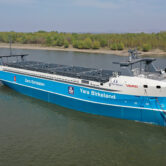(CN) — Port authorities in Sicily were justified in detaining and inspecting private German humanitarian search-and-rescue vessels that arrived overloaded with asylum seekers they'd picked up from the Mediterranean Sea in 2020, a legal adviser for the European Union's highest court found on Tuesday.
In issuing his legal opinion for the European Court of Justice, Advocate General Athanasios Rantos said the court was wading into a legally ambiguous area because the EU and international bodies have not laid down clear laws and regulations for humanitarian vessels such as those operated by Sea-Watch, a Berlin-registered nonprofit humanitarian group whose vessels ply the waters off the coasts of Libya and Tunisia in search of asylum seekers trying to make it to Europe on dinghies, rafts and other flimsy vessels.
Despite this legal lacuna, Rantos said under existing maritime and port laws Sicilian authorities in Palermo and Port Empedocles had proper reason to detain two Sea-Watch vessels in the summer of 2020 after they showed up with more people than their vessels were certified to carry.
According to Rantos, under such circumstances port authorities had reason to fear the vessels might pose a safety risk to those aboard the vessels, to other marine traffic and to the environment. His nonbinding advisory opinion was not immediately available in English.
Inspectors found numerous “technical and operational deficiencies, some of which were considered as clearly hazardous to safety, health or environment, and therefore both port authorities ordered that the ships be detained,” Rantos said.
Sea-Watch challenged the decisions to detain its vessels and the case wound up in front of a regional court in Sicily, which in turn asked the EU's high court in Luxembourg to weigh in.
Rantos said private search-and-rescue vessels like Sea-Watch's should not fall into a category of vessels where EU rules limit the authority of ports to conduct inspections, namely pleasure boats such as yachts, fishing vessels, warships and rudimentary wooden boats.
Still, Rantos was quick to note that an absence of a clear legal definition for the status of the private search-and-rescue vessels complicates rendering a judgment. Advocates general like Rantos study cases pending before the EU's highest court and then provide detailed legal analysis and propose how the court should rule. Their opinions often serve as the basis for the court's rulings, but not always.
“The main difficulty presented by the cases in question results from the absence of international or European legislation governing the systematic exercise of search and rescue activities at sea by private individuals,” Rantos said, as translated from Italian.
He noted that such private search-and-rescue vessels have grown in number in recent years, in large part because of “the shortcomings of state and international organizations” to deal with the “increasingly critical situation regarding the safety of people crossing the Mediterranean Sea aboard makeshift boats.”
“Up to now, the international and European legislators have refrained from filling this gap and from taking a direct position in the face of this phenomenon,” he wrote.
He added that the “absence of specific rules” for these vessels can create ambiguity and “lead to the circumvention of the rules on entry” into ports and “even encourage this type of activity.”
The private humanitarian vessels are a topic of heated debate in Europe and have been at the center of numerous legal fights, most notably involving Italy's former Interior Minister Matteo Salvini, who is facing criminal charges after he refused to allow humanitarian vessels carrying hundreds of asylum seekers from docking in Italy in 2018 and 2019.
Salvini and other anti-immigrant politicians accuse the private vessels of encouraging asylum seekers to attempt to cross the Mediterranean and even of colluding with human smugglers. Instead, Salvini, a far-right politician who remains popular in Italy, argues that Libyan and Italian coast guard ships should be left to perform search-and-rescue missions. The EU pays countries like Libya, Turkey and Morocco large sums to stop the flow of asylum seekers from impoverished and war-torn countries in Africa, the Middle East and Asia.
However, humanitarian groups accuse EU nations of not doing nearly enough patrols of the Mediterranean, leaving scores of people to drown, and they accuse the Libyan coast guard, which is funded by the EU to conduct search-and-rescue operations, of deliberately allowing people to drown.
Sea-Watch did not immediately respond to a query seeking comment. The group continues to operate in the Mediterranean and as recently as Saturday picked up 128 asylum seekers in trouble off the coast of Libya.
Courthouse News reporter Cain Burdeau is based in the European Union.
Subscribe to Closing Arguments
Sign up for new weekly newsletter Closing Arguments to get the latest about ongoing trials, major litigation and hot cases and rulings in courthouses around the U.S. and the world.









